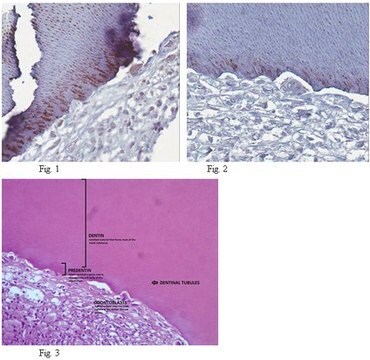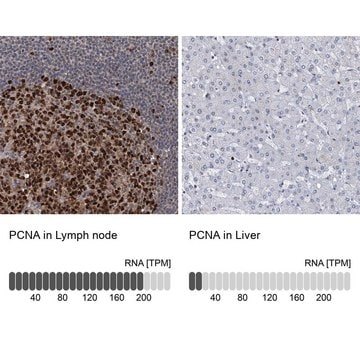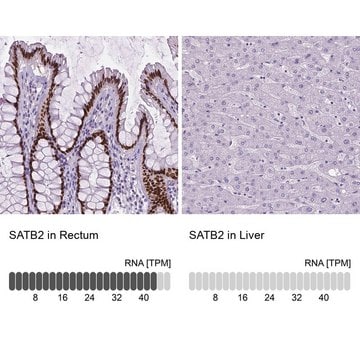MABS519-AF647
Anti-P40 Antibody, clone 11F12.1, Alexa Fluor™ 647
clone 11F12.1, from mouse, ALEXA FLUOR™ 647
Synonyme(s) :
Tumor protein 63, p63, Chronic ulcerative stomatitis protein, CUSP, Keratinocyte transcription factor KET, Transformation-related protein 63, TP63, Tumor protein p73-like, p73L, p40, p51, P40
About This Item
Produits recommandés
Source biologique
mouse
Niveau de qualité
Conjugué
ALEXA FLUOR™ 647
Forme d'anticorps
purified antibody
Type de produit anticorps
primary antibodies
Clone
11F12.1, monoclonal
Espèces réactives
mouse, human
Technique(s)
immunocytochemistry: suitable
Numéro d'accès NCBI
Numéro d'accès UniProt
Conditions d'expédition
wet ice
Modification post-traductionnelle de la cible
unmodified
Informations sur le gène
human ... TP63(8626)
Description générale
Spécificité
Immunogène
Application
The unconjugated version (Cat. No. MABS519) has been shown to work in WB, IH(P).
Signaling
Signaling Neuroscience
Qualité
Immunocytochemistry Analysis: A 1:100 dilution of this antibody detected P40 in NIH/3T3 cells.
Description de la cible
Forme physique
Stockage et stabilité
Autres remarques
Informations légales
Clause de non-responsabilité
Vous ne trouvez pas le bon produit ?
Essayez notre Outil de sélection de produits.
Code de la classe de stockage
10 - Combustible liquids
Classe de danger pour l'eau (WGK)
WGK 2
Point d'éclair (°F)
Not applicable
Point d'éclair (°C)
Not applicable
Certificats d'analyse (COA)
Recherchez un Certificats d'analyse (COA) en saisissant le numéro de lot du produit. Les numéros de lot figurent sur l'étiquette du produit après les mots "Lot" ou "Batch".
Déjà en possession de ce produit ?
Retrouvez la documentation relative aux produits que vous avez récemment achetés dans la Bibliothèque de documents.
Notre équipe de scientifiques dispose d'une expérience dans tous les secteurs de la recherche, notamment en sciences de la vie, science des matériaux, synthèse chimique, chromatographie, analyse et dans de nombreux autres domaines..
Contacter notre Service technique








